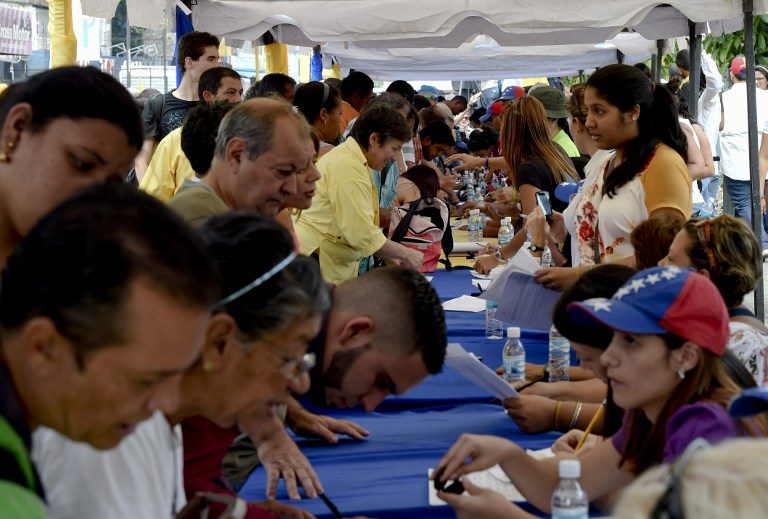SUMMARY
This is AI generated summarization, which may have errors. For context, always refer to the full article.

CARACAS, Venezuela – Venezuelans lined up Wednesday, April 27, to seek a recall referendum against President Nicolas Maduro, exasperated with a grinding crisis that has paralyzed government offices 5 days a week and triggered rolling blackouts.
A day after Maduro announced his latest drastic measures to tackle power shortages in the recession-hit country, the opposition began gathering signatures for an official petition to launch a referendum.
Citizens queued up to sign, voicing anger at Maduro over a crisis that has led to power outages for 4 hours a day in most of the country, exacerbating an already disastrous economic implosion.
“I came to sign it to end this anarchy,” said Miriam Leal, 54, in eastern Caracas.
“We don’t have medicine, work, education, and on top of that there is the electricity problem.”
The International Monetary Fund issued a stark warning on the state of Venezuela’s oil-dependent economy, hit hard by the collapse in global crude prices.
“The economic situation is not sustainable in the medium term,” said Alejandro Werner, director of the IMF’s Western Hemisphere department.
The IMF warned the economy would shrink 8% this year and inflation would exceed 700%.
The crisis is taking an increasingly heavy toll on weary Venezuelans.
As the 40 days of blackouts kicked in across 8 states – not including Caracas – looting was reported in several places, including the country’s second-biggest city, Maracaibo.
“The situation is very tense. There are areas that have been nearly 10 hours without electricity,” said Doris Falcon, a Maracaibo resident.
Officials said they had arrested nearly 100 people in the city for “acts of vandalism.”
Isolated incidents were also reported in the capital.
No paychecks for lawmakers
A defiant Maduro went on national television to insist he would serve out his term.
“None of what they (the opposition) are doing is politically viable, and the revolution here is going to continue,” he said.
Maduro is under pressure from the center-right opposition, which took control of the National Assembly in January after winning a landslide election victory.
National Assembly speaker Henry Ramos Allup said Wednesday the legislature is the latest victim of the crisis: it has run out of money after the government failed to allocate its budget, he told journalists.
“There’s no money to pay salaries this month” for lawmakers or employees, he said.
Maduro on Tuesday announced enforced leave for public sector employees 3 workdays a week for at least two weeks in a bid to slash electricity use.
His Vice President Aristobulo Isturiz also said primary and high schools would be closed Fridays.
Electricity shortages have compounded an economic crisis that has left Venezuelans queueing for hours in shops to buy scarce goods.
Venezuela has the world’s largest oil reserves.
But the government has resisted using crude to generate electricity, calling it inefficient. Neither has it built more generating plants with other technologies.
The government blames the power shortage on a drought caused by the El Niño weather phenomenon, which has caused the country’s hydroelectric dams to run low.
Critics blame government mismanagement.
The government also plans to shift its time zone forward Sunday, May 1, by 30 minutes to save power by extending daylight hours.
Referendum by Christmas?
Leading opposition figure Henrique Capriles said his side hoped to hold a referendum as early as November.
The opposition advanced Tuesday, April 26, in its quest to oust Maduro when the National Electoral Board handed over the paperwork allowing them to seek the nearly 200,000 signatures needed as a first step towards calling a referendum.
Ramos, the National Assembly speaker, accused Maduro’s camp of “terrorizing” government employees to prevent them from signing the recall petition.
Political analysts say Maduro’s allies could stall until January 2017, at which point a successful recall vote would no longer trigger new elections but transfer power to the vice president.
Maduro’s opponents say he controls the National Electoral Board and the Supreme Court, which has blocked their bills in the legislature.
Analysts and some politicians have warned that public discontent could lead to mass unrest in the country, which is already ranked by the United Nations as one of the most violent in the world.
Anti-government protests left 43 people dead in 2014. – Maria Isabel Sanchez, AFP / Rappler.com
Add a comment
How does this make you feel?
There are no comments yet. Add your comment to start the conversation.